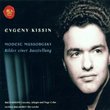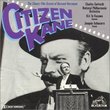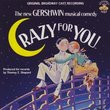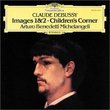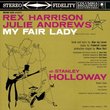| All Artists: Robert Schumann, Daniel Barenboim, Staatskapelle Berlin Title: Schumann - The Symphonies / Barenboim, Berlin Staatskapelle Members Wishing: 0 Total Copies: 0 Label: Warner Classics Original Release Date: 1/1/2004 Re-Release Date: 1/6/2004 Genre: Classical Style: Symphonies Number of Discs: 2 SwapaCD Credits: 2 UPC: 825646117925 |
Search - Robert Schumann, Daniel Barenboim, Staatskapelle Berlin :: Schumann - The Symphonies / Barenboim, Berlin Staatskapelle
 | Robert Schumann, Daniel Barenboim, Staatskapelle Berlin Schumann - The Symphonies / Barenboim, Berlin Staatskapelle Genre: Classical Schumann's symphonies have persistently been plagued by indifferent audiences, bewildered performers, wrong-headed judgments and chronological confusion. The First, Op. 38, called "Spring" for its buoyancy, vigor and exube... more » |
Larger Image |
CD DetailsSynopsis
Amazon.com Schumann's symphonies have persistently been plagued by indifferent audiences, bewildered performers, wrong-headed judgments and chronological confusion. The First, Op. 38, called "Spring" for its buoyancy, vigor and exuberance, was written in 1841, as was the next; however, substantially revised in 1852, this is now known as No. 4 Op. 120. (Though rarely performed, the original version is well worth hearing.) The symphony known as the Second, Op. 61, was begun in 1845, laid aside for health reasons and finished the following year. No. 3, Op. 97, the "Rhenish," is perhaps the most popular; written in 1850, it evokes the Rhine, the "sacred river" Schumann loved, celebrated in song, and finally turned to for deliverance from unendurable despair. Although loyal to his classical roots, Schumann gave his innovative originality free rein in the last two symphonies: the Third has five movements, the thematically cyclical Fourth is played without a break, and he discarded the traditional Italian tempo markings for German ones. The performances recorded here should dispel the hoary fallacy that Schumann was a miniaturist incapable of handling large forms and inept at orchestration. The Staatskapelle, Berlin's oldest orchestra, has these symphonies in its bloodstream; as the Opera's pit band, its glorious sound is undoubtedly influenced by working with singers: free of sharp edges and attacks, sustained, warm, and mellow. Barenboim, its Music Director since 1992, approaches the symphonies with profound intellectual understanding and emotional affinity, combining a sense of structure, coherence, irresistible sweep and grandeur with loving attention to expressive detail. Carefully balancing sonorities, he brings out usually hidden lines and voices, proving that Schumann's orchestration, often called turgid, is in fact transparent and full of color. The first symphony's triumphant opening fanfare immediately takes us deep into Schumann's world of ardent, poetic romanticism, spontaneous imagination, mercurial mood changes: the sometimes gracious, sometimes ominous, spooky Scherzos, the vivacious, jubilant corner movements, the achingly beautiful slow ones. This is an indispensable record. --Edith Eisler Similarly Requested CDs
|
CD ReviewsBarenboim clears the cobwebs with this great cycle John Kwok | New York, NY USA | 04/27/2004 (5 out of 5 stars) "Daniel Barenboim's riveting interpretations of Schumann's symphonies are among the finest ever recorded. Here he makes a very persuasive case for Schumann's great talents as an orchestral composer, which sadly have been often overlooked or dismissed (Indeed no less an authority than George Szell made "improvements" to the score in his critically acclaimed Schumann symphony cycle with the Cleveland Orchestra recorded back in the early 1960's.). These are startlingly fresh, intriguing interpretations that are far removed from more conventional accounts from the likes of Masur, Haitink, to name but a few, and are as fresh as Gardiner's. Barenboim's interpretations may lack the exuberance of a Bernstein or a Sinopoli, but they still glisten with much empathy and admiration for Schumann and his music, emphasizing the rich sonic architecture of each score, most notably those for the 1st, 2nd and 4th symphonies. My only disappointment is the opening movement of the 3rd "Rhenish" Symphony, which isn't played with as much gusto as those I've heard from Bernstein, Sinopoli, Sawallisch or Kubelik. Each performance is graced with admirably warm, elegant playing from the Berlin Staatskapelle, which sounds nearly as fine as recordings of these symphonies by the likes of the Vienna Philharmonic (Bernstein) and Bavarian Radio Symphony Orchestra (Kubelik). Indeed, the Berlin Staatskapelle's performances resemble mostly those of the Dresden Staatskapelle (Sawallisch, Sinopoli), with nearly the same ambient warm tones emanating from the strings and woodwinds. This admirable two-CD set shows the finest performances I have heard from the Berlin Staatskapelle under Barenboim's baton. Without question, it is not only Warner Classics' best orchestral classical recording from 2003, but truly one of the finest of that year; I regard it as one of the truly definitive Schumann symphony cycles ever recorded, alongside those from the likes of Bernstein (both, but especially with the Vienna Philharmonic Orchestra) and Kubelik (both, but especially with the Bavarian Radio Symphony Orchestra)." The problems of Schumann's symphonies are swept away Daniel Graser | Wappingers Falls, New York United States | 05/30/2005 (5 out of 5 stars) "For this recording, Barenboim has found the ideal orchestral color to effectively make a case for the Schumann symphonies. The color of the winds is especially warm and focused with wonderful horns and fantastic blend from the strings. The mood of each of the pieces is captured quite well. The first is appropriately vibrant as is the epic third which features unbelievable horn playing. Throughout, rhythmic security is maintained at all dynamics and tempos as is sustained presence of melody and balance with accompaniment. There is no note here without direction and focus. I would definitely recommend this as a first recording of the symphonies, followed closely by Szell's classic recordings." Warmth, excitement and fabulous playing Stephen Campbell | Dandenong Ranges, VIC Australia | 11/02/2007 (5 out of 5 stars) "I've never found the recordings I've listened to previously of the Schumann symphonies to be as engaging as I felt they should - and were reputed - to be. Considering the mixed reviews I'd read on this Schumann cycle by Barenboim, I was very interested to see what my own impressions would be - would they be favorable? (or would they be a waste of money?)
The result was that I found these performances immediately involving - and something of a revelation. Now it seems to me I can hear their true greatness as works. The recording is excellent, the playing is superb (especially the brass) and the performances are both weighty (without sounding like Bruckner, as another reviewer stated) and lyrical, with many beautifully realised details. I do find the 1st a little pulled around, but the overall set is excellent. Whereas Zinman (for me) robs the works of their natural romantic and poetic qualities - imparting great clarity at the expense of character. In Zinman's hands they sound less significant as works (purely personal). Previously, I've also heard Sawallisch, and I have Thielmann, Wand and Harnoncourt. Despite some undoubtedly fine aspects to their performances, this new set puts them all in the shade." |

